Analysis of Volkswagen's Global Business Environment in China
VerifiedAdded on 2022/09/14
|11
|3322
|18
Report
AI Summary
This report provides a comprehensive analysis of Volkswagen's operations within the global business environment, specifically focusing on its activities in China. The study examines the factors driving globalization and their impact on VW's internationalization, including market opportunities and competitive advantages. It delves into the political and economic systems influencing VW's success, such as foreign direct investment and government policies, alongside cultural factors affecting operations. The report explores the importance of culture, free trade policies, protectionism, and ethical issues, including the emissions scandal and corporate social responsibility (CSR) initiatives. Recommendations are provided, focusing on culture change, regaining consumer trust, improving productivity, and developing partnerships to achieve the company's 2025 strategic goals. The report concludes with an assessment of VW's performance and its ability to navigate the complexities of the global business landscape in China.
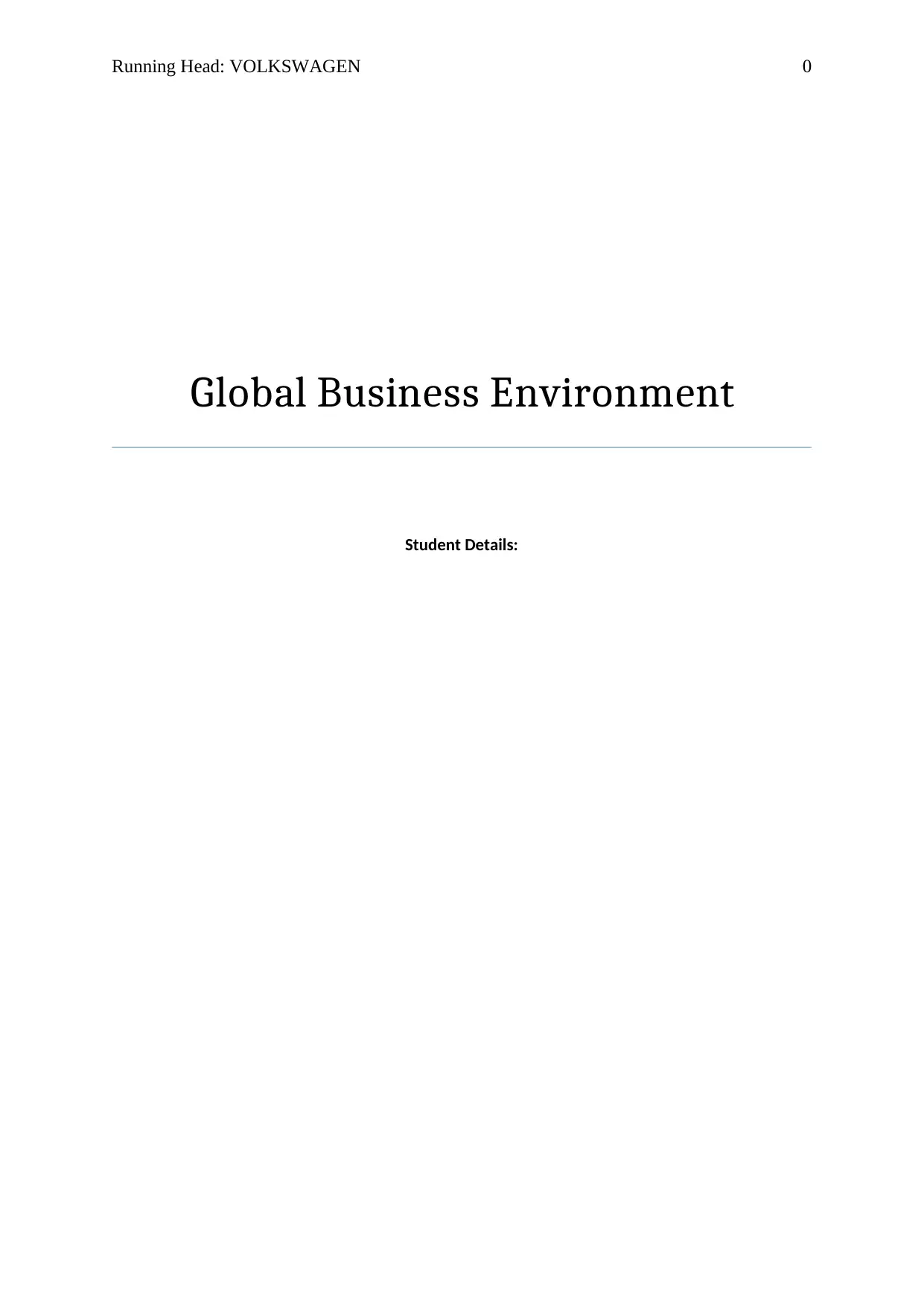
Running Head: VOLKSWAGEN 0
Global Business Environment
Student Details:
Global Business Environment
Student Details:
Paraphrase This Document
Need a fresh take? Get an instant paraphrase of this document with our AI Paraphraser
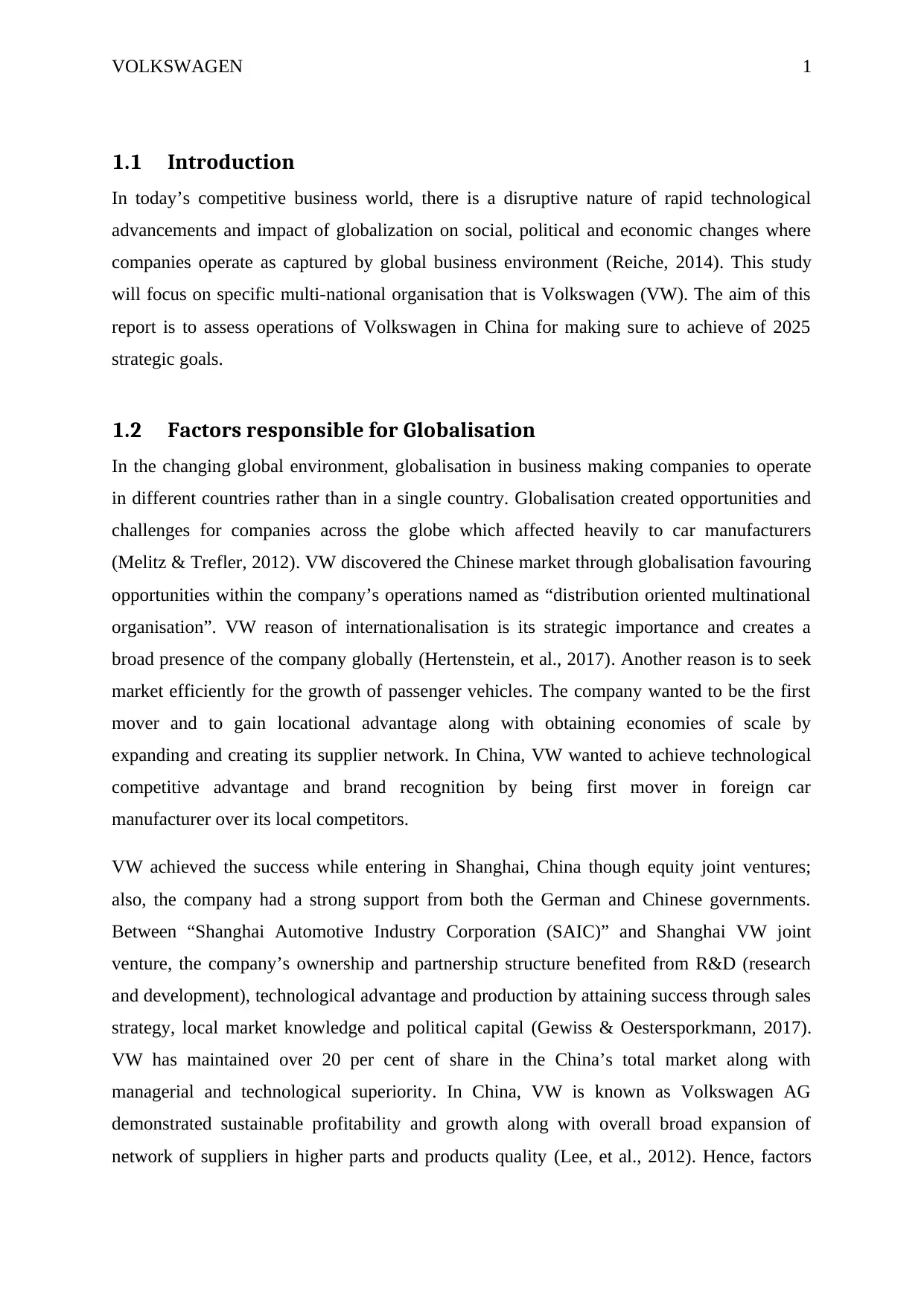
VOLKSWAGEN 1
1.1 Introduction
In today’s competitive business world, there is a disruptive nature of rapid technological
advancements and impact of globalization on social, political and economic changes where
companies operate as captured by global business environment (Reiche, 2014). This study
will focus on specific multi-national organisation that is Volkswagen (VW). The aim of this
report is to assess operations of Volkswagen in China for making sure to achieve of 2025
strategic goals.
1.2 Factors responsible for Globalisation
In the changing global environment, globalisation in business making companies to operate
in different countries rather than in a single country. Globalisation created opportunities and
challenges for companies across the globe which affected heavily to car manufacturers
(Melitz & Trefler, 2012). VW discovered the Chinese market through globalisation favouring
opportunities within the company’s operations named as “distribution oriented multinational
organisation”. VW reason of internationalisation is its strategic importance and creates a
broad presence of the company globally (Hertenstein, et al., 2017). Another reason is to seek
market efficiently for the growth of passenger vehicles. The company wanted to be the first
mover and to gain locational advantage along with obtaining economies of scale by
expanding and creating its supplier network. In China, VW wanted to achieve technological
competitive advantage and brand recognition by being first mover in foreign car
manufacturer over its local competitors.
VW achieved the success while entering in Shanghai, China though equity joint ventures;
also, the company had a strong support from both the German and Chinese governments.
Between “Shanghai Automotive Industry Corporation (SAIC)” and Shanghai VW joint
venture, the company’s ownership and partnership structure benefited from R&D (research
and development), technological advantage and production by attaining success through sales
strategy, local market knowledge and political capital (Gewiss & Oestersporkmann, 2017).
VW has maintained over 20 per cent of share in the China’s total market along with
managerial and technological superiority. In China, VW is known as Volkswagen AG
demonstrated sustainable profitability and growth along with overall broad expansion of
network of suppliers in higher parts and products quality (Lee, et al., 2012). Hence, factors
1.1 Introduction
In today’s competitive business world, there is a disruptive nature of rapid technological
advancements and impact of globalization on social, political and economic changes where
companies operate as captured by global business environment (Reiche, 2014). This study
will focus on specific multi-national organisation that is Volkswagen (VW). The aim of this
report is to assess operations of Volkswagen in China for making sure to achieve of 2025
strategic goals.
1.2 Factors responsible for Globalisation
In the changing global environment, globalisation in business making companies to operate
in different countries rather than in a single country. Globalisation created opportunities and
challenges for companies across the globe which affected heavily to car manufacturers
(Melitz & Trefler, 2012). VW discovered the Chinese market through globalisation favouring
opportunities within the company’s operations named as “distribution oriented multinational
organisation”. VW reason of internationalisation is its strategic importance and creates a
broad presence of the company globally (Hertenstein, et al., 2017). Another reason is to seek
market efficiently for the growth of passenger vehicles. The company wanted to be the first
mover and to gain locational advantage along with obtaining economies of scale by
expanding and creating its supplier network. In China, VW wanted to achieve technological
competitive advantage and brand recognition by being first mover in foreign car
manufacturer over its local competitors.
VW achieved the success while entering in Shanghai, China though equity joint ventures;
also, the company had a strong support from both the German and Chinese governments.
Between “Shanghai Automotive Industry Corporation (SAIC)” and Shanghai VW joint
venture, the company’s ownership and partnership structure benefited from R&D (research
and development), technological advantage and production by attaining success through sales
strategy, local market knowledge and political capital (Gewiss & Oestersporkmann, 2017).
VW has maintained over 20 per cent of share in the China’s total market along with
managerial and technological superiority. In China, VW is known as Volkswagen AG
demonstrated sustainable profitability and growth along with overall broad expansion of
network of suppliers in higher parts and products quality (Lee, et al., 2012). Hence, factors
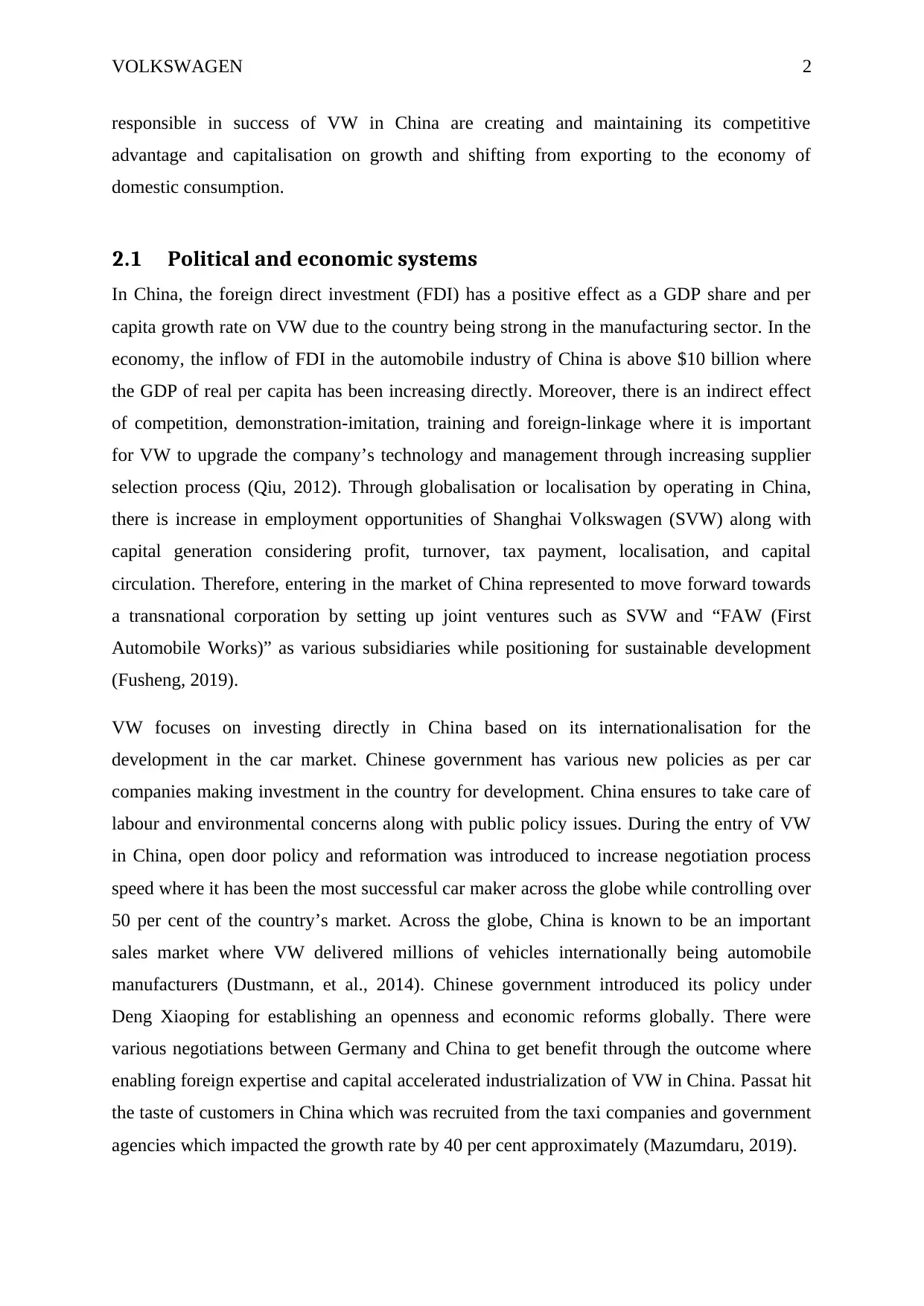
VOLKSWAGEN 2
responsible in success of VW in China are creating and maintaining its competitive
advantage and capitalisation on growth and shifting from exporting to the economy of
domestic consumption.
2.1 Political and economic systems
In China, the foreign direct investment (FDI) has a positive effect as a GDP share and per
capita growth rate on VW due to the country being strong in the manufacturing sector. In the
economy, the inflow of FDI in the automobile industry of China is above $10 billion where
the GDP of real per capita has been increasing directly. Moreover, there is an indirect effect
of competition, demonstration-imitation, training and foreign-linkage where it is important
for VW to upgrade the company’s technology and management through increasing supplier
selection process (Qiu, 2012). Through globalisation or localisation by operating in China,
there is increase in employment opportunities of Shanghai Volkswagen (SVW) along with
capital generation considering profit, turnover, tax payment, localisation, and capital
circulation. Therefore, entering in the market of China represented to move forward towards
a transnational corporation by setting up joint ventures such as SVW and “FAW (First
Automobile Works)” as various subsidiaries while positioning for sustainable development
(Fusheng, 2019).
VW focuses on investing directly in China based on its internationalisation for the
development in the car market. Chinese government has various new policies as per car
companies making investment in the country for development. China ensures to take care of
labour and environmental concerns along with public policy issues. During the entry of VW
in China, open door policy and reformation was introduced to increase negotiation process
speed where it has been the most successful car maker across the globe while controlling over
50 per cent of the country’s market. Across the globe, China is known to be an important
sales market where VW delivered millions of vehicles internationally being automobile
manufacturers (Dustmann, et al., 2014). Chinese government introduced its policy under
Deng Xiaoping for establishing an openness and economic reforms globally. There were
various negotiations between Germany and China to get benefit through the outcome where
enabling foreign expertise and capital accelerated industrialization of VW in China. Passat hit
the taste of customers in China which was recruited from the taxi companies and government
agencies which impacted the growth rate by 40 per cent approximately (Mazumdaru, 2019).
responsible in success of VW in China are creating and maintaining its competitive
advantage and capitalisation on growth and shifting from exporting to the economy of
domestic consumption.
2.1 Political and economic systems
In China, the foreign direct investment (FDI) has a positive effect as a GDP share and per
capita growth rate on VW due to the country being strong in the manufacturing sector. In the
economy, the inflow of FDI in the automobile industry of China is above $10 billion where
the GDP of real per capita has been increasing directly. Moreover, there is an indirect effect
of competition, demonstration-imitation, training and foreign-linkage where it is important
for VW to upgrade the company’s technology and management through increasing supplier
selection process (Qiu, 2012). Through globalisation or localisation by operating in China,
there is increase in employment opportunities of Shanghai Volkswagen (SVW) along with
capital generation considering profit, turnover, tax payment, localisation, and capital
circulation. Therefore, entering in the market of China represented to move forward towards
a transnational corporation by setting up joint ventures such as SVW and “FAW (First
Automobile Works)” as various subsidiaries while positioning for sustainable development
(Fusheng, 2019).
VW focuses on investing directly in China based on its internationalisation for the
development in the car market. Chinese government has various new policies as per car
companies making investment in the country for development. China ensures to take care of
labour and environmental concerns along with public policy issues. During the entry of VW
in China, open door policy and reformation was introduced to increase negotiation process
speed where it has been the most successful car maker across the globe while controlling over
50 per cent of the country’s market. Across the globe, China is known to be an important
sales market where VW delivered millions of vehicles internationally being automobile
manufacturers (Dustmann, et al., 2014). Chinese government introduced its policy under
Deng Xiaoping for establishing an openness and economic reforms globally. There were
various negotiations between Germany and China to get benefit through the outcome where
enabling foreign expertise and capital accelerated industrialization of VW in China. Passat hit
the taste of customers in China which was recruited from the taxi companies and government
agencies which impacted the growth rate by 40 per cent approximately (Mazumdaru, 2019).
⊘ This is a preview!⊘
Do you want full access?
Subscribe today to unlock all pages.

Trusted by 1+ million students worldwide
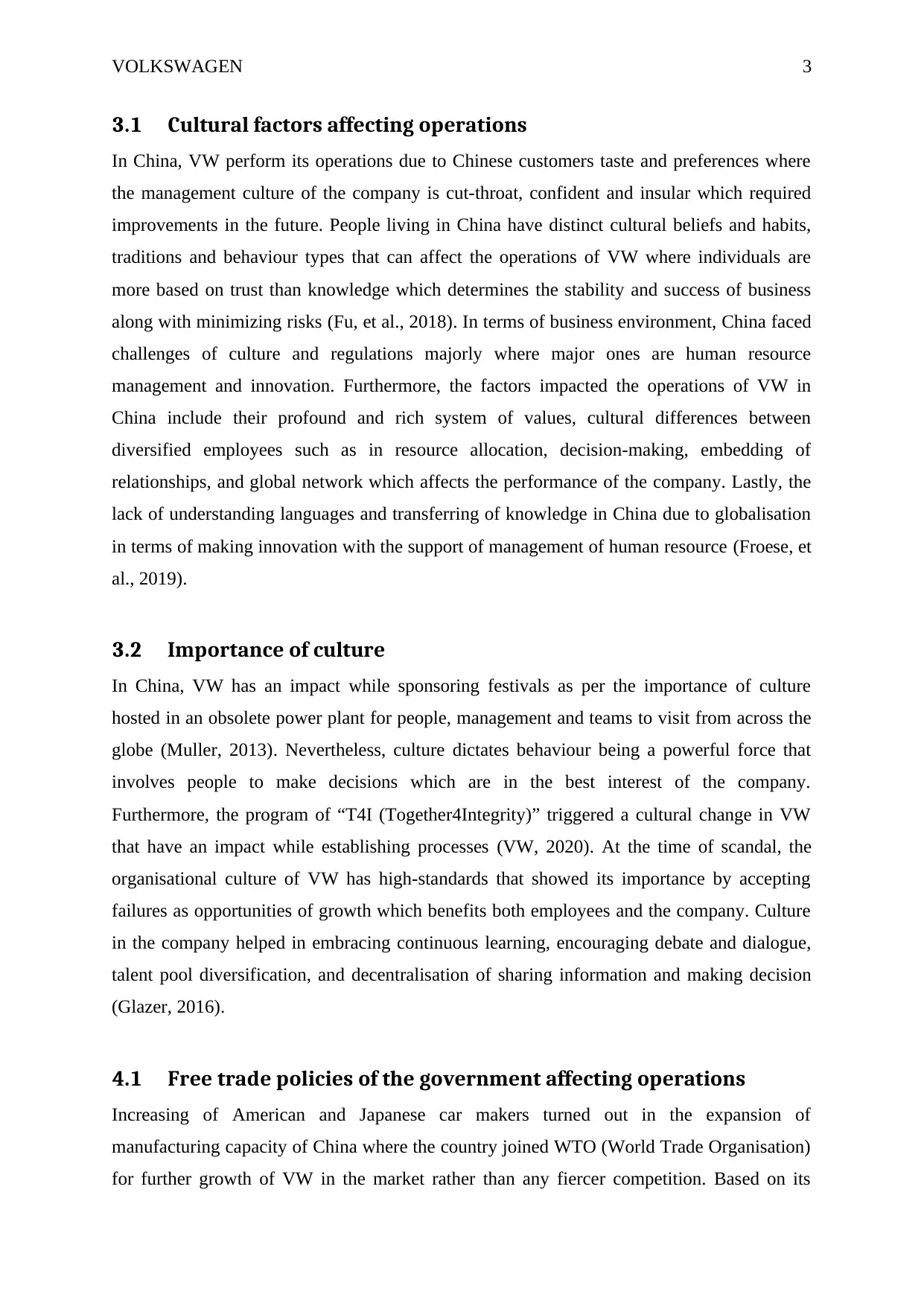
VOLKSWAGEN 3
3.1 Cultural factors affecting operations
In China, VW perform its operations due to Chinese customers taste and preferences where
the management culture of the company is cut-throat, confident and insular which required
improvements in the future. People living in China have distinct cultural beliefs and habits,
traditions and behaviour types that can affect the operations of VW where individuals are
more based on trust than knowledge which determines the stability and success of business
along with minimizing risks (Fu, et al., 2018). In terms of business environment, China faced
challenges of culture and regulations majorly where major ones are human resource
management and innovation. Furthermore, the factors impacted the operations of VW in
China include their profound and rich system of values, cultural differences between
diversified employees such as in resource allocation, decision-making, embedding of
relationships, and global network which affects the performance of the company. Lastly, the
lack of understanding languages and transferring of knowledge in China due to globalisation
in terms of making innovation with the support of management of human resource (Froese, et
al., 2019).
3.2 Importance of culture
In China, VW has an impact while sponsoring festivals as per the importance of culture
hosted in an obsolete power plant for people, management and teams to visit from across the
globe (Muller, 2013). Nevertheless, culture dictates behaviour being a powerful force that
involves people to make decisions which are in the best interest of the company.
Furthermore, the program of “T4I (Together4Integrity)” triggered a cultural change in VW
that have an impact while establishing processes (VW, 2020). At the time of scandal, the
organisational culture of VW has high-standards that showed its importance by accepting
failures as opportunities of growth which benefits both employees and the company. Culture
in the company helped in embracing continuous learning, encouraging debate and dialogue,
talent pool diversification, and decentralisation of sharing information and making decision
(Glazer, 2016).
4.1 Free trade policies of the government affecting operations
Increasing of American and Japanese car makers turned out in the expansion of
manufacturing capacity of China where the country joined WTO (World Trade Organisation)
for further growth of VW in the market rather than any fiercer competition. Based on its
3.1 Cultural factors affecting operations
In China, VW perform its operations due to Chinese customers taste and preferences where
the management culture of the company is cut-throat, confident and insular which required
improvements in the future. People living in China have distinct cultural beliefs and habits,
traditions and behaviour types that can affect the operations of VW where individuals are
more based on trust than knowledge which determines the stability and success of business
along with minimizing risks (Fu, et al., 2018). In terms of business environment, China faced
challenges of culture and regulations majorly where major ones are human resource
management and innovation. Furthermore, the factors impacted the operations of VW in
China include their profound and rich system of values, cultural differences between
diversified employees such as in resource allocation, decision-making, embedding of
relationships, and global network which affects the performance of the company. Lastly, the
lack of understanding languages and transferring of knowledge in China due to globalisation
in terms of making innovation with the support of management of human resource (Froese, et
al., 2019).
3.2 Importance of culture
In China, VW has an impact while sponsoring festivals as per the importance of culture
hosted in an obsolete power plant for people, management and teams to visit from across the
globe (Muller, 2013). Nevertheless, culture dictates behaviour being a powerful force that
involves people to make decisions which are in the best interest of the company.
Furthermore, the program of “T4I (Together4Integrity)” triggered a cultural change in VW
that have an impact while establishing processes (VW, 2020). At the time of scandal, the
organisational culture of VW has high-standards that showed its importance by accepting
failures as opportunities of growth which benefits both employees and the company. Culture
in the company helped in embracing continuous learning, encouraging debate and dialogue,
talent pool diversification, and decentralisation of sharing information and making decision
(Glazer, 2016).
4.1 Free trade policies of the government affecting operations
Increasing of American and Japanese car makers turned out in the expansion of
manufacturing capacity of China where the country joined WTO (World Trade Organisation)
for further growth of VW in the market rather than any fiercer competition. Based on its
Paraphrase This Document
Need a fresh take? Get an instant paraphrase of this document with our AI Paraphraser
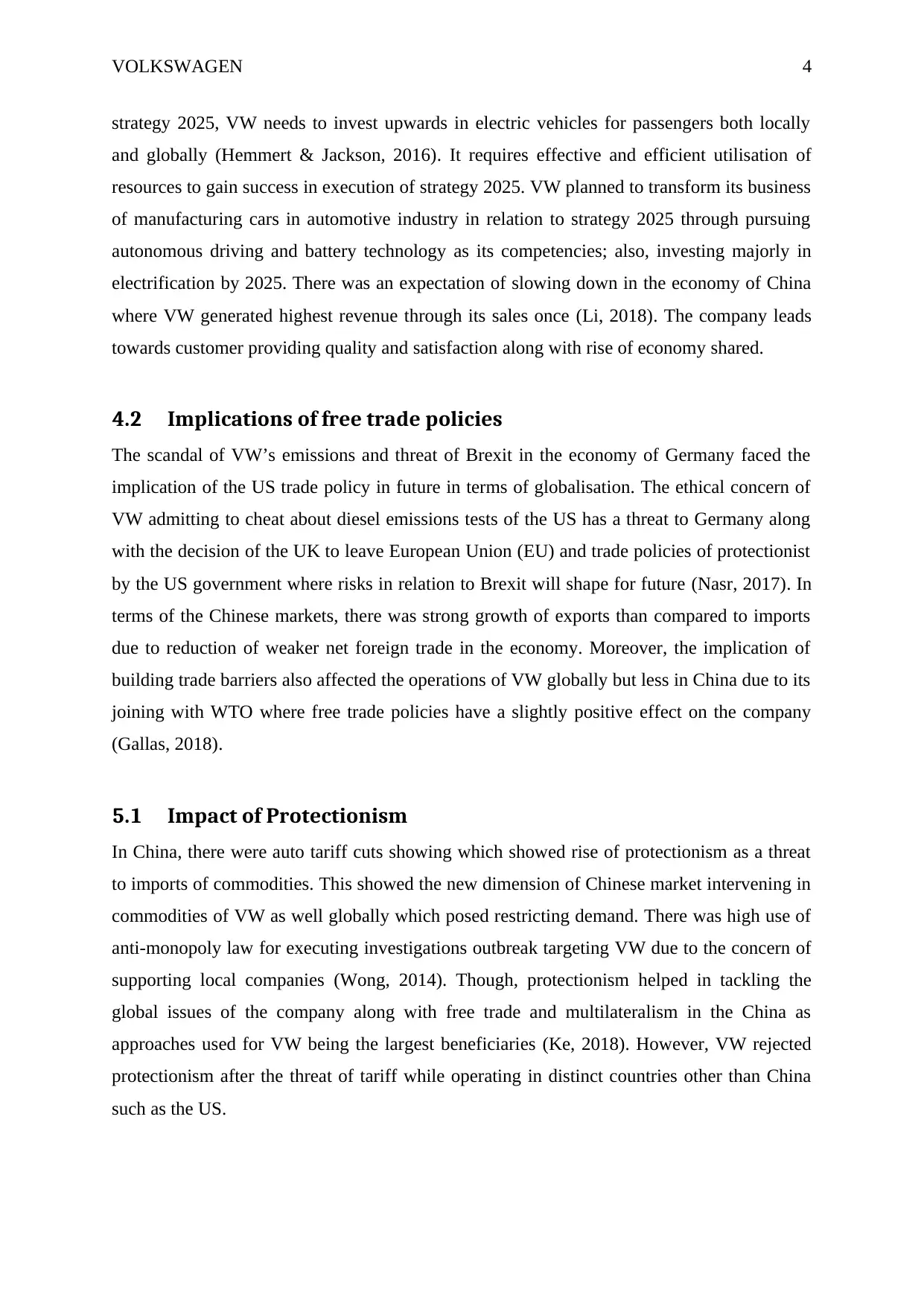
VOLKSWAGEN 4
strategy 2025, VW needs to invest upwards in electric vehicles for passengers both locally
and globally (Hemmert & Jackson, 2016). It requires effective and efficient utilisation of
resources to gain success in execution of strategy 2025. VW planned to transform its business
of manufacturing cars in automotive industry in relation to strategy 2025 through pursuing
autonomous driving and battery technology as its competencies; also, investing majorly in
electrification by 2025. There was an expectation of slowing down in the economy of China
where VW generated highest revenue through its sales once (Li, 2018). The company leads
towards customer providing quality and satisfaction along with rise of economy shared.
4.2 Implications of free trade policies
The scandal of VW’s emissions and threat of Brexit in the economy of Germany faced the
implication of the US trade policy in future in terms of globalisation. The ethical concern of
VW admitting to cheat about diesel emissions tests of the US has a threat to Germany along
with the decision of the UK to leave European Union (EU) and trade policies of protectionist
by the US government where risks in relation to Brexit will shape for future (Nasr, 2017). In
terms of the Chinese markets, there was strong growth of exports than compared to imports
due to reduction of weaker net foreign trade in the economy. Moreover, the implication of
building trade barriers also affected the operations of VW globally but less in China due to its
joining with WTO where free trade policies have a slightly positive effect on the company
(Gallas, 2018).
5.1 Impact of Protectionism
In China, there were auto tariff cuts showing which showed rise of protectionism as a threat
to imports of commodities. This showed the new dimension of Chinese market intervening in
commodities of VW as well globally which posed restricting demand. There was high use of
anti-monopoly law for executing investigations outbreak targeting VW due to the concern of
supporting local companies (Wong, 2014). Though, protectionism helped in tackling the
global issues of the company along with free trade and multilateralism in the China as
approaches used for VW being the largest beneficiaries (Ke, 2018). However, VW rejected
protectionism after the threat of tariff while operating in distinct countries other than China
such as the US.
strategy 2025, VW needs to invest upwards in electric vehicles for passengers both locally
and globally (Hemmert & Jackson, 2016). It requires effective and efficient utilisation of
resources to gain success in execution of strategy 2025. VW planned to transform its business
of manufacturing cars in automotive industry in relation to strategy 2025 through pursuing
autonomous driving and battery technology as its competencies; also, investing majorly in
electrification by 2025. There was an expectation of slowing down in the economy of China
where VW generated highest revenue through its sales once (Li, 2018). The company leads
towards customer providing quality and satisfaction along with rise of economy shared.
4.2 Implications of free trade policies
The scandal of VW’s emissions and threat of Brexit in the economy of Germany faced the
implication of the US trade policy in future in terms of globalisation. The ethical concern of
VW admitting to cheat about diesel emissions tests of the US has a threat to Germany along
with the decision of the UK to leave European Union (EU) and trade policies of protectionist
by the US government where risks in relation to Brexit will shape for future (Nasr, 2017). In
terms of the Chinese markets, there was strong growth of exports than compared to imports
due to reduction of weaker net foreign trade in the economy. Moreover, the implication of
building trade barriers also affected the operations of VW globally but less in China due to its
joining with WTO where free trade policies have a slightly positive effect on the company
(Gallas, 2018).
5.1 Impact of Protectionism
In China, there were auto tariff cuts showing which showed rise of protectionism as a threat
to imports of commodities. This showed the new dimension of Chinese market intervening in
commodities of VW as well globally which posed restricting demand. There was high use of
anti-monopoly law for executing investigations outbreak targeting VW due to the concern of
supporting local companies (Wong, 2014). Though, protectionism helped in tackling the
global issues of the company along with free trade and multilateralism in the China as
approaches used for VW being the largest beneficiaries (Ke, 2018). However, VW rejected
protectionism after the threat of tariff while operating in distinct countries other than China
such as the US.
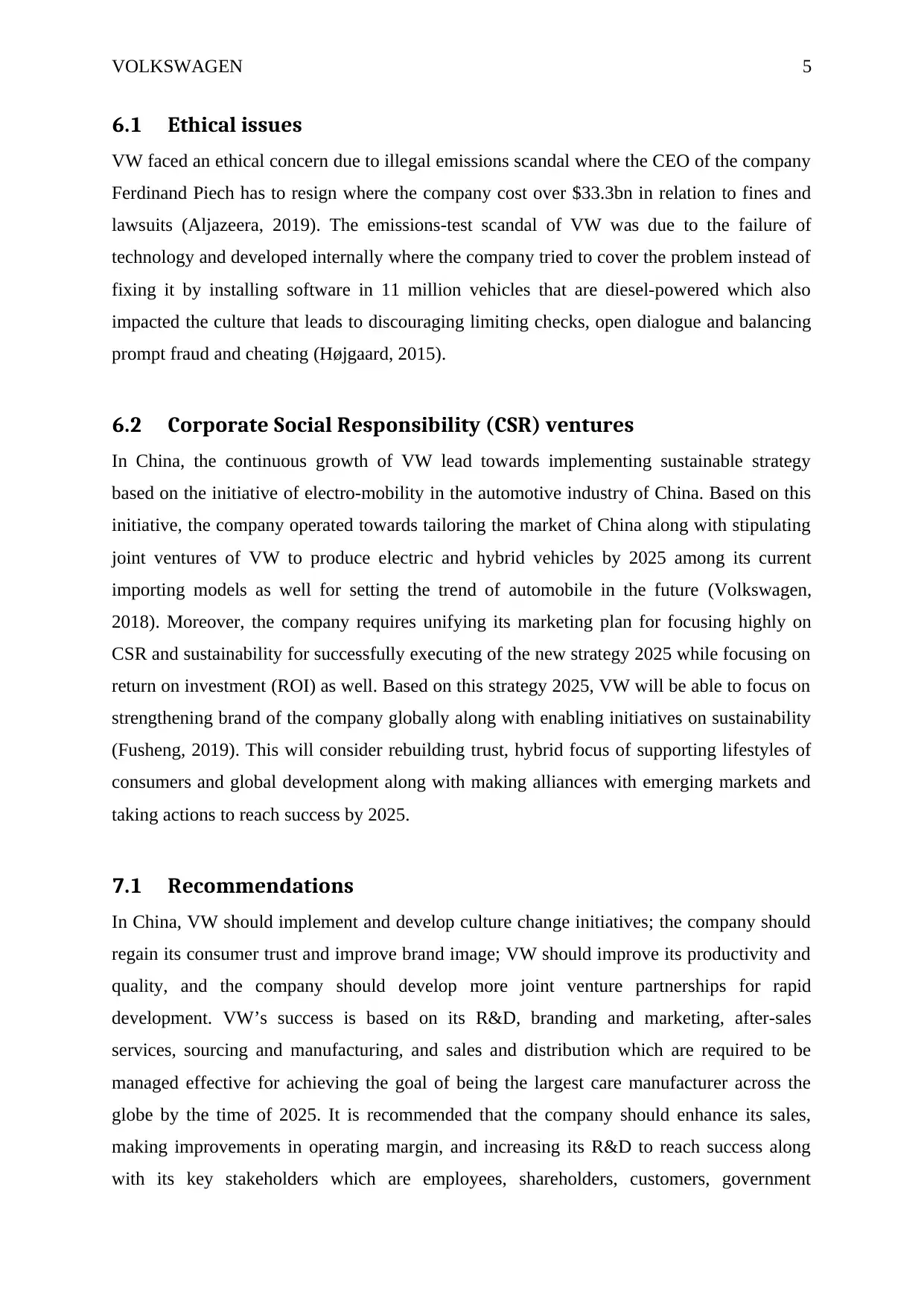
VOLKSWAGEN 5
6.1 Ethical issues
VW faced an ethical concern due to illegal emissions scandal where the CEO of the company
Ferdinand Piech has to resign where the company cost over $33.3bn in relation to fines and
lawsuits (Aljazeera, 2019). The emissions-test scandal of VW was due to the failure of
technology and developed internally where the company tried to cover the problem instead of
fixing it by installing software in 11 million vehicles that are diesel-powered which also
impacted the culture that leads to discouraging limiting checks, open dialogue and balancing
prompt fraud and cheating (Højgaard, 2015).
6.2 Corporate Social Responsibility (CSR) ventures
In China, the continuous growth of VW lead towards implementing sustainable strategy
based on the initiative of electro-mobility in the automotive industry of China. Based on this
initiative, the company operated towards tailoring the market of China along with stipulating
joint ventures of VW to produce electric and hybrid vehicles by 2025 among its current
importing models as well for setting the trend of automobile in the future (Volkswagen,
2018). Moreover, the company requires unifying its marketing plan for focusing highly on
CSR and sustainability for successfully executing of the new strategy 2025 while focusing on
return on investment (ROI) as well. Based on this strategy 2025, VW will be able to focus on
strengthening brand of the company globally along with enabling initiatives on sustainability
(Fusheng, 2019). This will consider rebuilding trust, hybrid focus of supporting lifestyles of
consumers and global development along with making alliances with emerging markets and
taking actions to reach success by 2025.
7.1 Recommendations
In China, VW should implement and develop culture change initiatives; the company should
regain its consumer trust and improve brand image; VW should improve its productivity and
quality, and the company should develop more joint venture partnerships for rapid
development. VW’s success is based on its R&D, branding and marketing, after-sales
services, sourcing and manufacturing, and sales and distribution which are required to be
managed effective for achieving the goal of being the largest care manufacturer across the
globe by the time of 2025. It is recommended that the company should enhance its sales,
making improvements in operating margin, and increasing its R&D to reach success along
with its key stakeholders which are employees, shareholders, customers, government
6.1 Ethical issues
VW faced an ethical concern due to illegal emissions scandal where the CEO of the company
Ferdinand Piech has to resign where the company cost over $33.3bn in relation to fines and
lawsuits (Aljazeera, 2019). The emissions-test scandal of VW was due to the failure of
technology and developed internally where the company tried to cover the problem instead of
fixing it by installing software in 11 million vehicles that are diesel-powered which also
impacted the culture that leads to discouraging limiting checks, open dialogue and balancing
prompt fraud and cheating (Højgaard, 2015).
6.2 Corporate Social Responsibility (CSR) ventures
In China, the continuous growth of VW lead towards implementing sustainable strategy
based on the initiative of electro-mobility in the automotive industry of China. Based on this
initiative, the company operated towards tailoring the market of China along with stipulating
joint ventures of VW to produce electric and hybrid vehicles by 2025 among its current
importing models as well for setting the trend of automobile in the future (Volkswagen,
2018). Moreover, the company requires unifying its marketing plan for focusing highly on
CSR and sustainability for successfully executing of the new strategy 2025 while focusing on
return on investment (ROI) as well. Based on this strategy 2025, VW will be able to focus on
strengthening brand of the company globally along with enabling initiatives on sustainability
(Fusheng, 2019). This will consider rebuilding trust, hybrid focus of supporting lifestyles of
consumers and global development along with making alliances with emerging markets and
taking actions to reach success by 2025.
7.1 Recommendations
In China, VW should implement and develop culture change initiatives; the company should
regain its consumer trust and improve brand image; VW should improve its productivity and
quality, and the company should develop more joint venture partnerships for rapid
development. VW’s success is based on its R&D, branding and marketing, after-sales
services, sourcing and manufacturing, and sales and distribution which are required to be
managed effective for achieving the goal of being the largest care manufacturer across the
globe by the time of 2025. It is recommended that the company should enhance its sales,
making improvements in operating margin, and increasing its R&D to reach success along
with its key stakeholders which are employees, shareholders, customers, government
⊘ This is a preview!⊘
Do you want full access?
Subscribe today to unlock all pages.

Trusted by 1+ million students worldwide
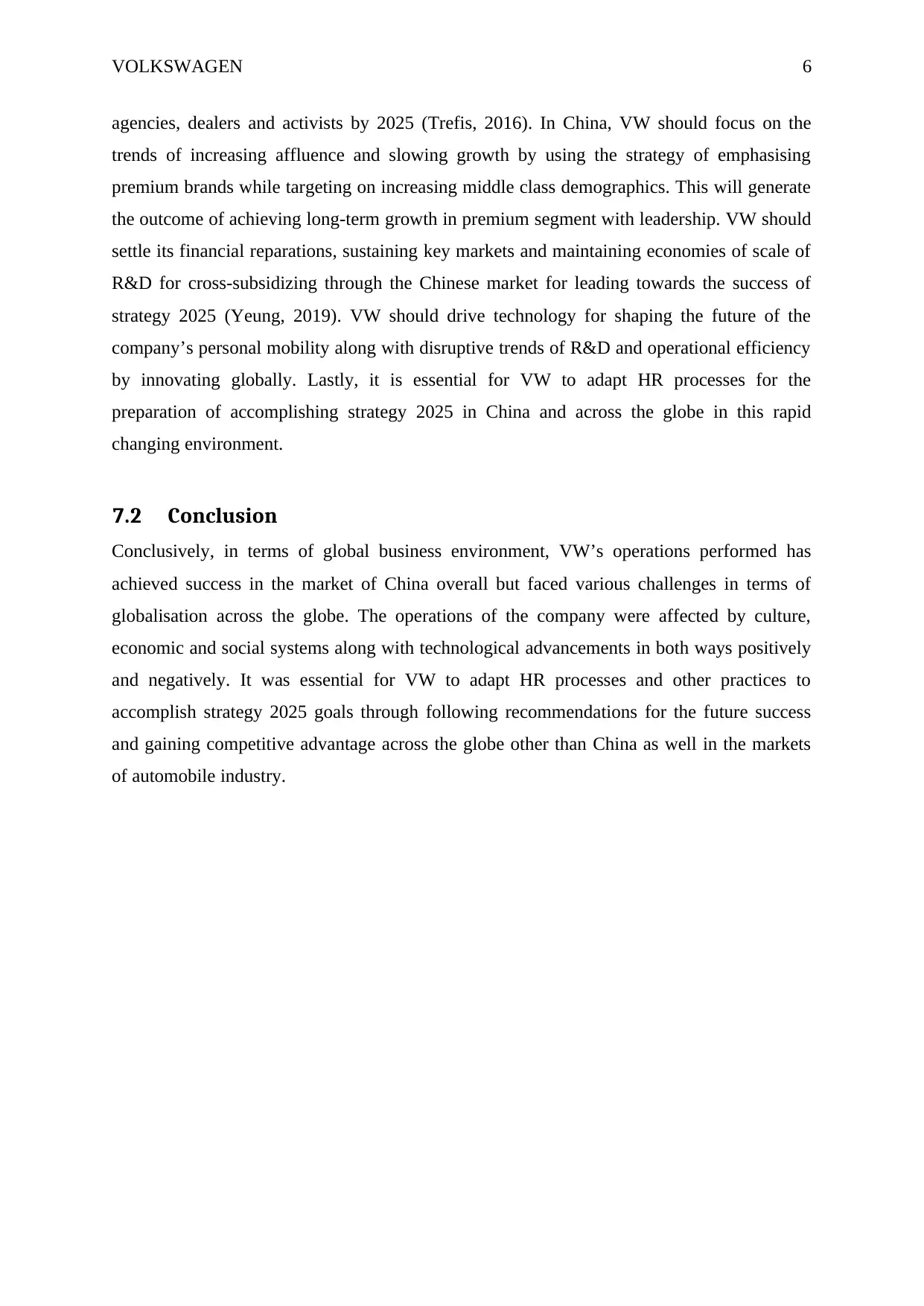
VOLKSWAGEN 6
agencies, dealers and activists by 2025 (Trefis, 2016). In China, VW should focus on the
trends of increasing affluence and slowing growth by using the strategy of emphasising
premium brands while targeting on increasing middle class demographics. This will generate
the outcome of achieving long-term growth in premium segment with leadership. VW should
settle its financial reparations, sustaining key markets and maintaining economies of scale of
R&D for cross-subsidizing through the Chinese market for leading towards the success of
strategy 2025 (Yeung, 2019). VW should drive technology for shaping the future of the
company’s personal mobility along with disruptive trends of R&D and operational efficiency
by innovating globally. Lastly, it is essential for VW to adapt HR processes for the
preparation of accomplishing strategy 2025 in China and across the globe in this rapid
changing environment.
7.2 Conclusion
Conclusively, in terms of global business environment, VW’s operations performed has
achieved success in the market of China overall but faced various challenges in terms of
globalisation across the globe. The operations of the company were affected by culture,
economic and social systems along with technological advancements in both ways positively
and negatively. It was essential for VW to adapt HR processes and other practices to
accomplish strategy 2025 goals through following recommendations for the future success
and gaining competitive advantage across the globe other than China as well in the markets
of automobile industry.
agencies, dealers and activists by 2025 (Trefis, 2016). In China, VW should focus on the
trends of increasing affluence and slowing growth by using the strategy of emphasising
premium brands while targeting on increasing middle class demographics. This will generate
the outcome of achieving long-term growth in premium segment with leadership. VW should
settle its financial reparations, sustaining key markets and maintaining economies of scale of
R&D for cross-subsidizing through the Chinese market for leading towards the success of
strategy 2025 (Yeung, 2019). VW should drive technology for shaping the future of the
company’s personal mobility along with disruptive trends of R&D and operational efficiency
by innovating globally. Lastly, it is essential for VW to adapt HR processes for the
preparation of accomplishing strategy 2025 in China and across the globe in this rapid
changing environment.
7.2 Conclusion
Conclusively, in terms of global business environment, VW’s operations performed has
achieved success in the market of China overall but faced various challenges in terms of
globalisation across the globe. The operations of the company were affected by culture,
economic and social systems along with technological advancements in both ways positively
and negatively. It was essential for VW to adapt HR processes and other practices to
accomplish strategy 2025 goals through following recommendations for the future success
and gaining competitive advantage across the globe other than China as well in the markets
of automobile industry.
Paraphrase This Document
Need a fresh take? Get an instant paraphrase of this document with our AI Paraphraser
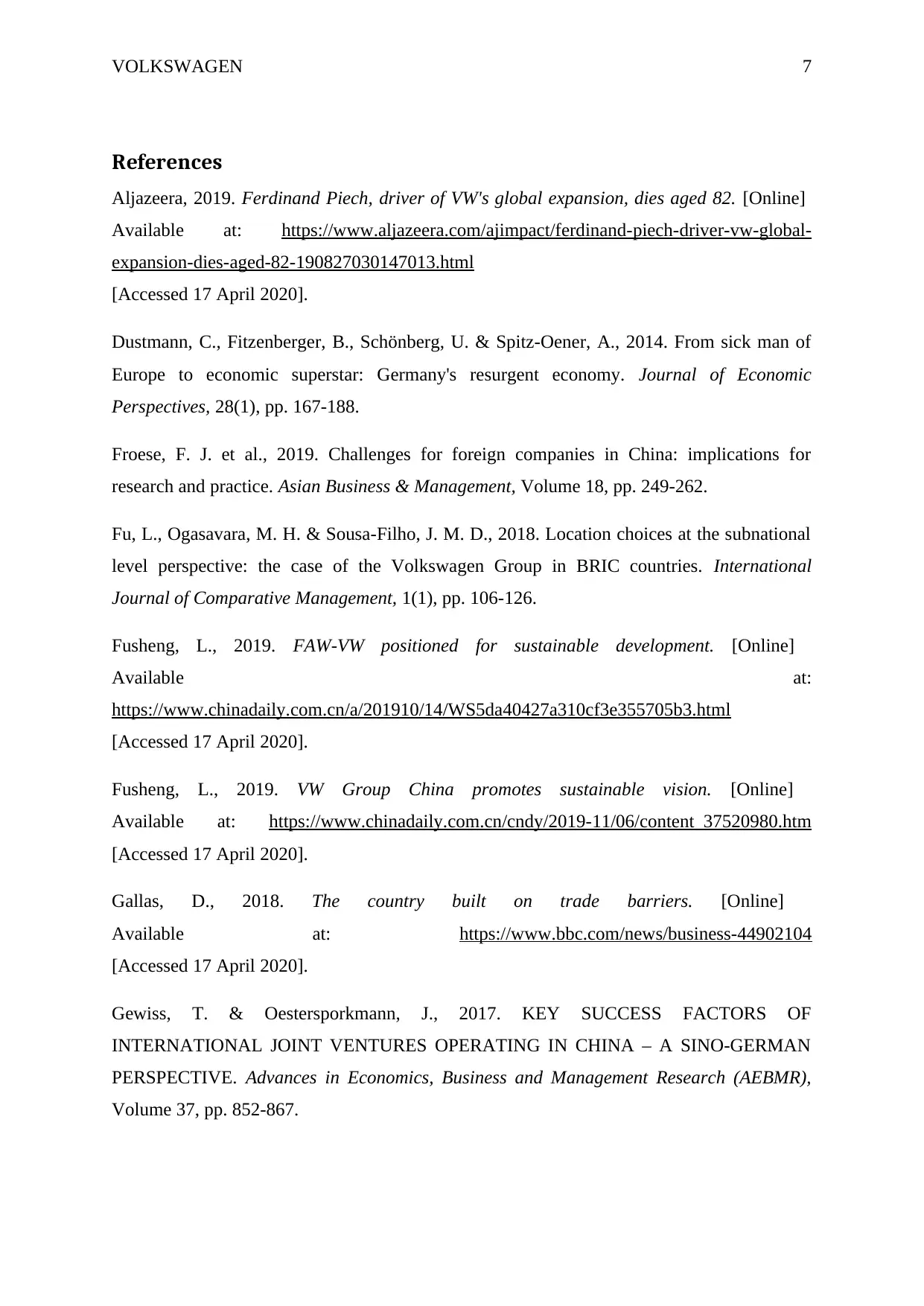
VOLKSWAGEN 7
References
Aljazeera, 2019. Ferdinand Piech, driver of VW's global expansion, dies aged 82. [Online]
Available at: https://www.aljazeera.com/ajimpact/ferdinand-piech-driver-vw-global-
expansion-dies-aged-82-190827030147013.html
[Accessed 17 April 2020].
Dustmann, C., Fitzenberger, B., Schönberg, U. & Spitz-Oener, A., 2014. From sick man of
Europe to economic superstar: Germany's resurgent economy. Journal of Economic
Perspectives, 28(1), pp. 167-188.
Froese, F. J. et al., 2019. Challenges for foreign companies in China: implications for
research and practice. Asian Business & Management, Volume 18, pp. 249-262.
Fu, L., Ogasavara, M. H. & Sousa-Filho, J. M. D., 2018. Location choices at the subnational
level perspective: the case of the Volkswagen Group in BRIC countries. International
Journal of Comparative Management, 1(1), pp. 106-126.
Fusheng, L., 2019. FAW-VW positioned for sustainable development. [Online]
Available at:
https://www.chinadaily.com.cn/a/201910/14/WS5da40427a310cf3e355705b3.html
[Accessed 17 April 2020].
Fusheng, L., 2019. VW Group China promotes sustainable vision. [Online]
Available at: https://www.chinadaily.com.cn/cndy/2019-11/06/content_37520980.htm
[Accessed 17 April 2020].
Gallas, D., 2018. The country built on trade barriers. [Online]
Available at: https://www.bbc.com/news/business-44902104
[Accessed 17 April 2020].
Gewiss, T. & Oestersporkmann, J., 2017. KEY SUCCESS FACTORS OF
INTERNATIONAL JOINT VENTURES OPERATING IN CHINA – A SINO-GERMAN
PERSPECTIVE. Advances in Economics, Business and Management Research (AEBMR),
Volume 37, pp. 852-867.
References
Aljazeera, 2019. Ferdinand Piech, driver of VW's global expansion, dies aged 82. [Online]
Available at: https://www.aljazeera.com/ajimpact/ferdinand-piech-driver-vw-global-
expansion-dies-aged-82-190827030147013.html
[Accessed 17 April 2020].
Dustmann, C., Fitzenberger, B., Schönberg, U. & Spitz-Oener, A., 2014. From sick man of
Europe to economic superstar: Germany's resurgent economy. Journal of Economic
Perspectives, 28(1), pp. 167-188.
Froese, F. J. et al., 2019. Challenges for foreign companies in China: implications for
research and practice. Asian Business & Management, Volume 18, pp. 249-262.
Fu, L., Ogasavara, M. H. & Sousa-Filho, J. M. D., 2018. Location choices at the subnational
level perspective: the case of the Volkswagen Group in BRIC countries. International
Journal of Comparative Management, 1(1), pp. 106-126.
Fusheng, L., 2019. FAW-VW positioned for sustainable development. [Online]
Available at:
https://www.chinadaily.com.cn/a/201910/14/WS5da40427a310cf3e355705b3.html
[Accessed 17 April 2020].
Fusheng, L., 2019. VW Group China promotes sustainable vision. [Online]
Available at: https://www.chinadaily.com.cn/cndy/2019-11/06/content_37520980.htm
[Accessed 17 April 2020].
Gallas, D., 2018. The country built on trade barriers. [Online]
Available at: https://www.bbc.com/news/business-44902104
[Accessed 17 April 2020].
Gewiss, T. & Oestersporkmann, J., 2017. KEY SUCCESS FACTORS OF
INTERNATIONAL JOINT VENTURES OPERATING IN CHINA – A SINO-GERMAN
PERSPECTIVE. Advances in Economics, Business and Management Research (AEBMR),
Volume 37, pp. 852-867.
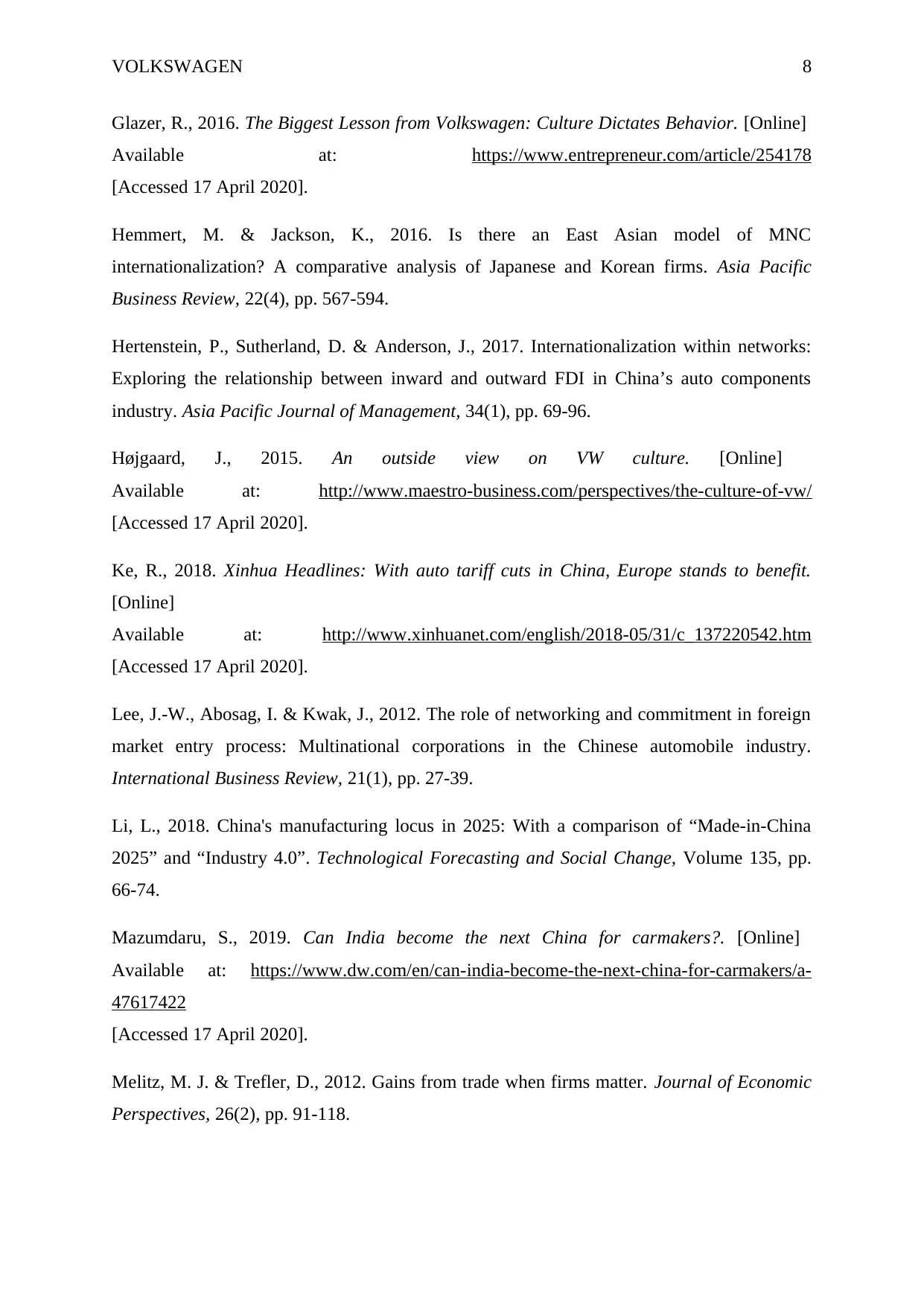
VOLKSWAGEN 8
Glazer, R., 2016. The Biggest Lesson from Volkswagen: Culture Dictates Behavior. [Online]
Available at: https://www.entrepreneur.com/article/254178
[Accessed 17 April 2020].
Hemmert, M. & Jackson, K., 2016. Is there an East Asian model of MNC
internationalization? A comparative analysis of Japanese and Korean firms. Asia Pacific
Business Review, 22(4), pp. 567-594.
Hertenstein, P., Sutherland, D. & Anderson, J., 2017. Internationalization within networks:
Exploring the relationship between inward and outward FDI in China’s auto components
industry. Asia Pacific Journal of Management, 34(1), pp. 69-96.
Højgaard, J., 2015. An outside view on VW culture. [Online]
Available at: http://www.maestro-business.com/perspectives/the-culture-of-vw/
[Accessed 17 April 2020].
Ke, R., 2018. Xinhua Headlines: With auto tariff cuts in China, Europe stands to benefit.
[Online]
Available at: http://www.xinhuanet.com/english/2018-05/31/c_137220542.htm
[Accessed 17 April 2020].
Lee, J.-W., Abosag, I. & Kwak, J., 2012. The role of networking and commitment in foreign
market entry process: Multinational corporations in the Chinese automobile industry.
International Business Review, 21(1), pp. 27-39.
Li, L., 2018. China's manufacturing locus in 2025: With a comparison of “Made-in-China
2025” and “Industry 4.0”. Technological Forecasting and Social Change, Volume 135, pp.
66-74.
Mazumdaru, S., 2019. Can India become the next China for carmakers?. [Online]
Available at: https://www.dw.com/en/can-india-become-the-next-china-for-carmakers/a-
47617422
[Accessed 17 April 2020].
Melitz, M. J. & Trefler, D., 2012. Gains from trade when firms matter. Journal of Economic
Perspectives, 26(2), pp. 91-118.
Glazer, R., 2016. The Biggest Lesson from Volkswagen: Culture Dictates Behavior. [Online]
Available at: https://www.entrepreneur.com/article/254178
[Accessed 17 April 2020].
Hemmert, M. & Jackson, K., 2016. Is there an East Asian model of MNC
internationalization? A comparative analysis of Japanese and Korean firms. Asia Pacific
Business Review, 22(4), pp. 567-594.
Hertenstein, P., Sutherland, D. & Anderson, J., 2017. Internationalization within networks:
Exploring the relationship between inward and outward FDI in China’s auto components
industry. Asia Pacific Journal of Management, 34(1), pp. 69-96.
Højgaard, J., 2015. An outside view on VW culture. [Online]
Available at: http://www.maestro-business.com/perspectives/the-culture-of-vw/
[Accessed 17 April 2020].
Ke, R., 2018. Xinhua Headlines: With auto tariff cuts in China, Europe stands to benefit.
[Online]
Available at: http://www.xinhuanet.com/english/2018-05/31/c_137220542.htm
[Accessed 17 April 2020].
Lee, J.-W., Abosag, I. & Kwak, J., 2012. The role of networking and commitment in foreign
market entry process: Multinational corporations in the Chinese automobile industry.
International Business Review, 21(1), pp. 27-39.
Li, L., 2018. China's manufacturing locus in 2025: With a comparison of “Made-in-China
2025” and “Industry 4.0”. Technological Forecasting and Social Change, Volume 135, pp.
66-74.
Mazumdaru, S., 2019. Can India become the next China for carmakers?. [Online]
Available at: https://www.dw.com/en/can-india-become-the-next-china-for-carmakers/a-
47617422
[Accessed 17 April 2020].
Melitz, M. J. & Trefler, D., 2012. Gains from trade when firms matter. Journal of Economic
Perspectives, 26(2), pp. 91-118.
⊘ This is a preview!⊘
Do you want full access?
Subscribe today to unlock all pages.

Trusted by 1+ million students worldwide
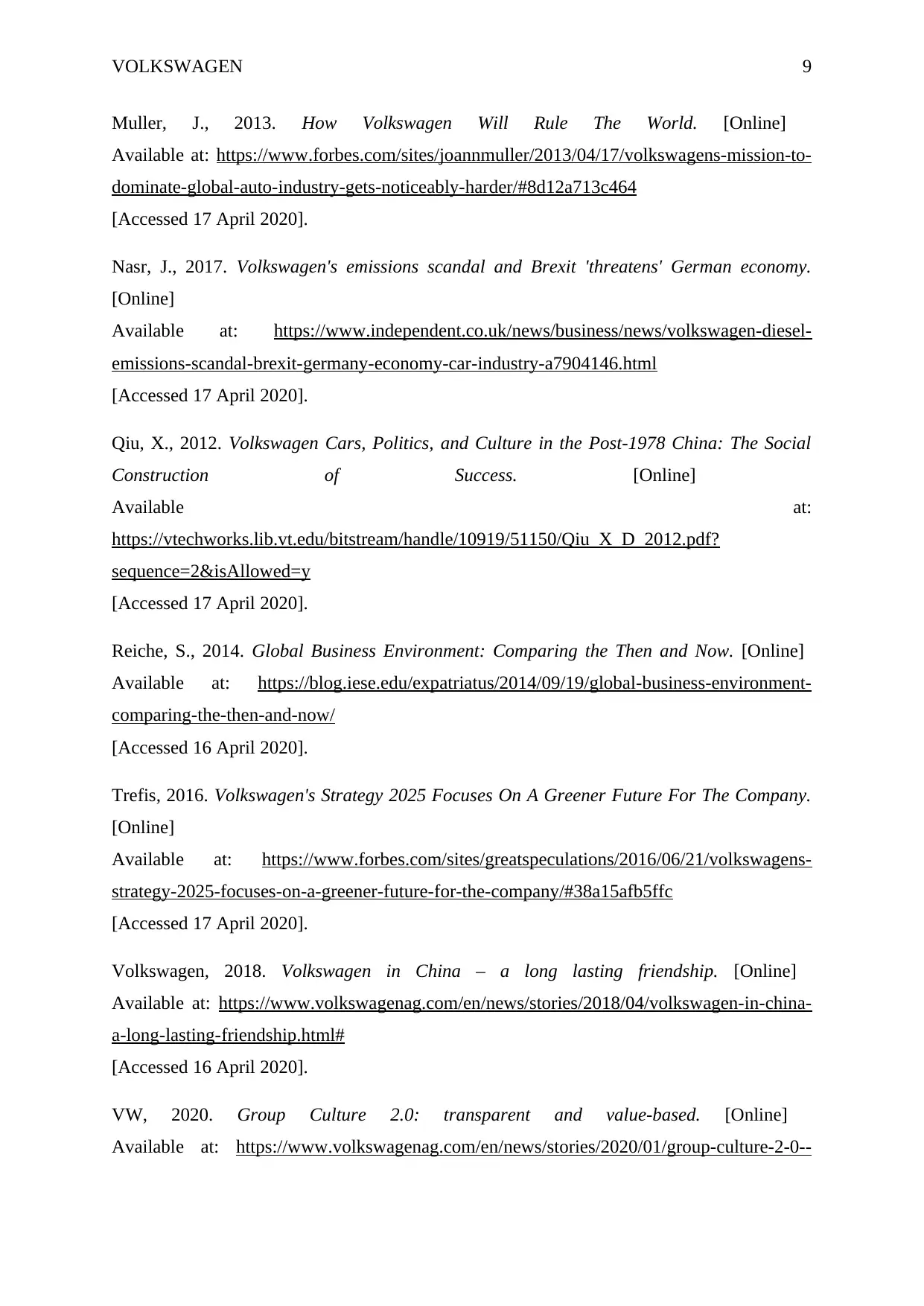
VOLKSWAGEN 9
Muller, J., 2013. How Volkswagen Will Rule The World. [Online]
Available at: https://www.forbes.com/sites/joannmuller/2013/04/17/volkswagens-mission-to-
dominate-global-auto-industry-gets-noticeably-harder/#8d12a713c464
[Accessed 17 April 2020].
Nasr, J., 2017. Volkswagen's emissions scandal and Brexit 'threatens' German economy.
[Online]
Available at: https://www.independent.co.uk/news/business/news/volkswagen-diesel-
emissions-scandal-brexit-germany-economy-car-industry-a7904146.html
[Accessed 17 April 2020].
Qiu, X., 2012. Volkswagen Cars, Politics, and Culture in the Post-1978 China: The Social
Construction of Success. [Online]
Available at:
https://vtechworks.lib.vt.edu/bitstream/handle/10919/51150/Qiu_X_D_2012.pdf?
sequence=2&isAllowed=y
[Accessed 17 April 2020].
Reiche, S., 2014. Global Business Environment: Comparing the Then and Now. [Online]
Available at: https://blog.iese.edu/expatriatus/2014/09/19/global-business-environment-
comparing-the-then-and-now/
[Accessed 16 April 2020].
Trefis, 2016. Volkswagen's Strategy 2025 Focuses On A Greener Future For The Company.
[Online]
Available at: https://www.forbes.com/sites/greatspeculations/2016/06/21/volkswagens-
strategy-2025-focuses-on-a-greener-future-for-the-company/#38a15afb5ffc
[Accessed 17 April 2020].
Volkswagen, 2018. Volkswagen in China – a long lasting friendship. [Online]
Available at: https://www.volkswagenag.com/en/news/stories/2018/04/volkswagen-in-china-
a-long-lasting-friendship.html#
[Accessed 16 April 2020].
VW, 2020. Group Culture 2.0: transparent and value-based. [Online]
Available at: https://www.volkswagenag.com/en/news/stories/2020/01/group-culture-2-0--
Muller, J., 2013. How Volkswagen Will Rule The World. [Online]
Available at: https://www.forbes.com/sites/joannmuller/2013/04/17/volkswagens-mission-to-
dominate-global-auto-industry-gets-noticeably-harder/#8d12a713c464
[Accessed 17 April 2020].
Nasr, J., 2017. Volkswagen's emissions scandal and Brexit 'threatens' German economy.
[Online]
Available at: https://www.independent.co.uk/news/business/news/volkswagen-diesel-
emissions-scandal-brexit-germany-economy-car-industry-a7904146.html
[Accessed 17 April 2020].
Qiu, X., 2012. Volkswagen Cars, Politics, and Culture in the Post-1978 China: The Social
Construction of Success. [Online]
Available at:
https://vtechworks.lib.vt.edu/bitstream/handle/10919/51150/Qiu_X_D_2012.pdf?
sequence=2&isAllowed=y
[Accessed 17 April 2020].
Reiche, S., 2014. Global Business Environment: Comparing the Then and Now. [Online]
Available at: https://blog.iese.edu/expatriatus/2014/09/19/global-business-environment-
comparing-the-then-and-now/
[Accessed 16 April 2020].
Trefis, 2016. Volkswagen's Strategy 2025 Focuses On A Greener Future For The Company.
[Online]
Available at: https://www.forbes.com/sites/greatspeculations/2016/06/21/volkswagens-
strategy-2025-focuses-on-a-greener-future-for-the-company/#38a15afb5ffc
[Accessed 17 April 2020].
Volkswagen, 2018. Volkswagen in China – a long lasting friendship. [Online]
Available at: https://www.volkswagenag.com/en/news/stories/2018/04/volkswagen-in-china-
a-long-lasting-friendship.html#
[Accessed 16 April 2020].
VW, 2020. Group Culture 2.0: transparent and value-based. [Online]
Available at: https://www.volkswagenag.com/en/news/stories/2020/01/group-culture-2-0--
Paraphrase This Document
Need a fresh take? Get an instant paraphrase of this document with our AI Paraphraser
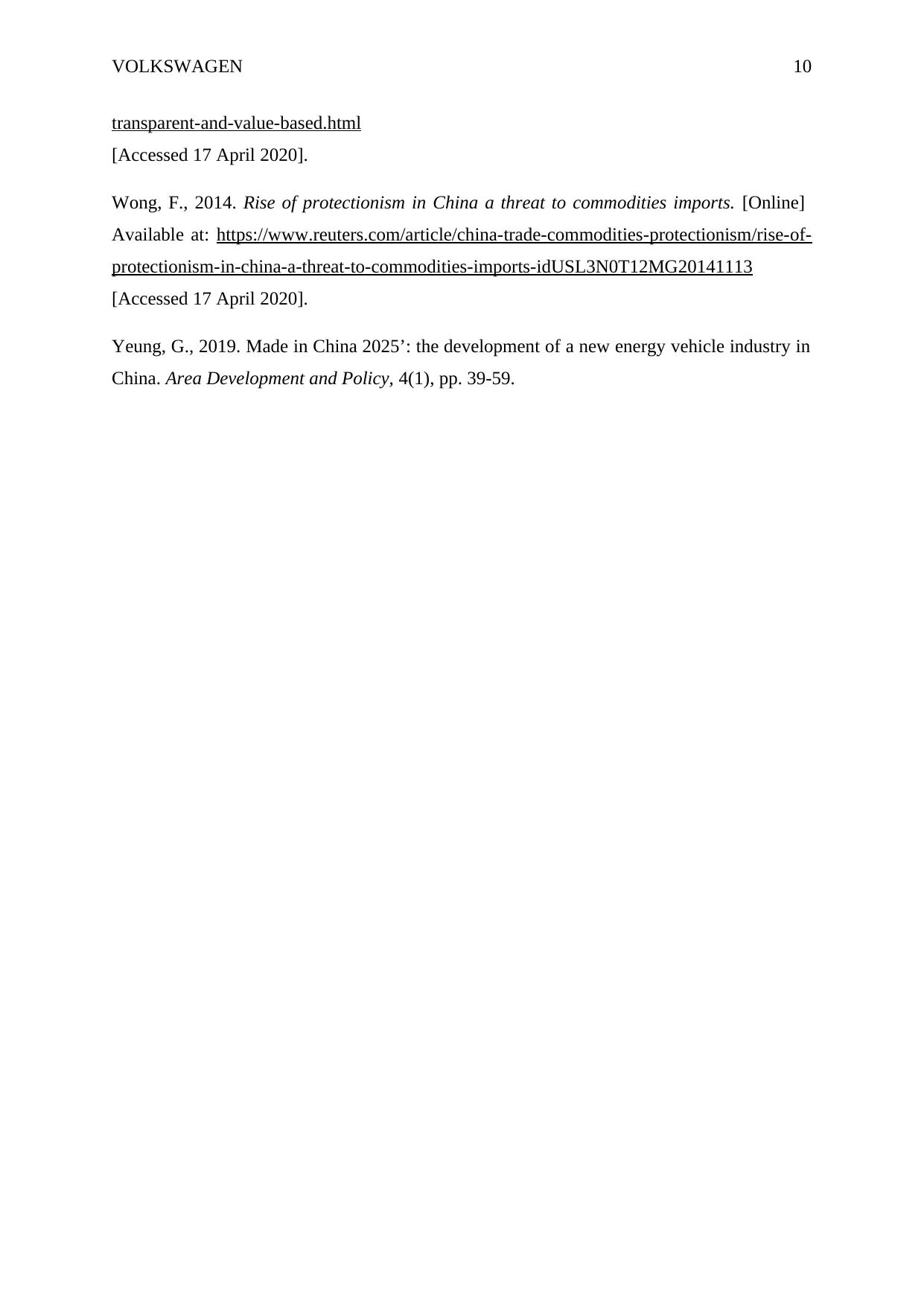
VOLKSWAGEN 10
transparent-and-value-based.html
[Accessed 17 April 2020].
Wong, F., 2014. Rise of protectionism in China a threat to commodities imports. [Online]
Available at: https://www.reuters.com/article/china-trade-commodities-protectionism/rise-of-
protectionism-in-china-a-threat-to-commodities-imports-idUSL3N0T12MG20141113
[Accessed 17 April 2020].
Yeung, G., 2019. Made in China 2025’: the development of a new energy vehicle industry in
China. Area Development and Policy, 4(1), pp. 39-59.
transparent-and-value-based.html
[Accessed 17 April 2020].
Wong, F., 2014. Rise of protectionism in China a threat to commodities imports. [Online]
Available at: https://www.reuters.com/article/china-trade-commodities-protectionism/rise-of-
protectionism-in-china-a-threat-to-commodities-imports-idUSL3N0T12MG20141113
[Accessed 17 April 2020].
Yeung, G., 2019. Made in China 2025’: the development of a new energy vehicle industry in
China. Area Development and Policy, 4(1), pp. 39-59.
1 out of 11
Related Documents
Your All-in-One AI-Powered Toolkit for Academic Success.
+13062052269
info@desklib.com
Available 24*7 on WhatsApp / Email
![[object Object]](/_next/static/media/star-bottom.7253800d.svg)
Unlock your academic potential
Copyright © 2020–2026 A2Z Services. All Rights Reserved. Developed and managed by ZUCOL.





